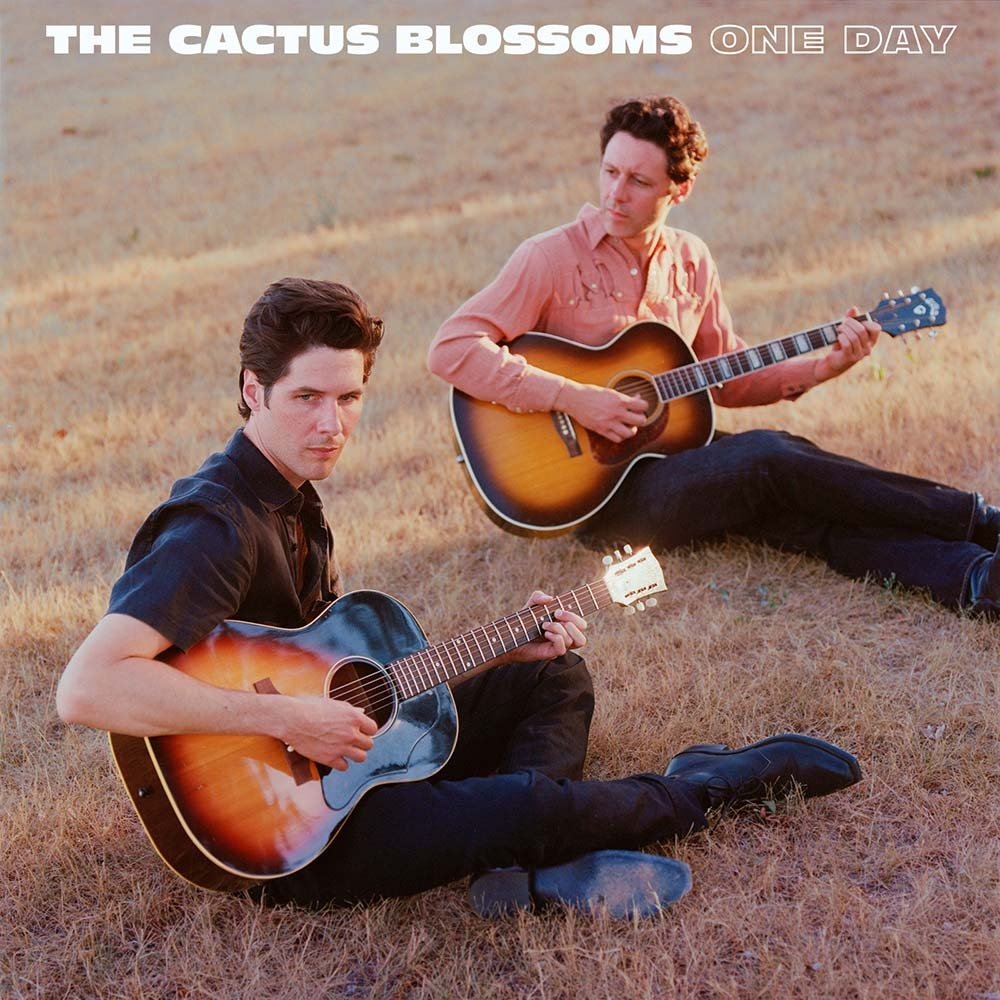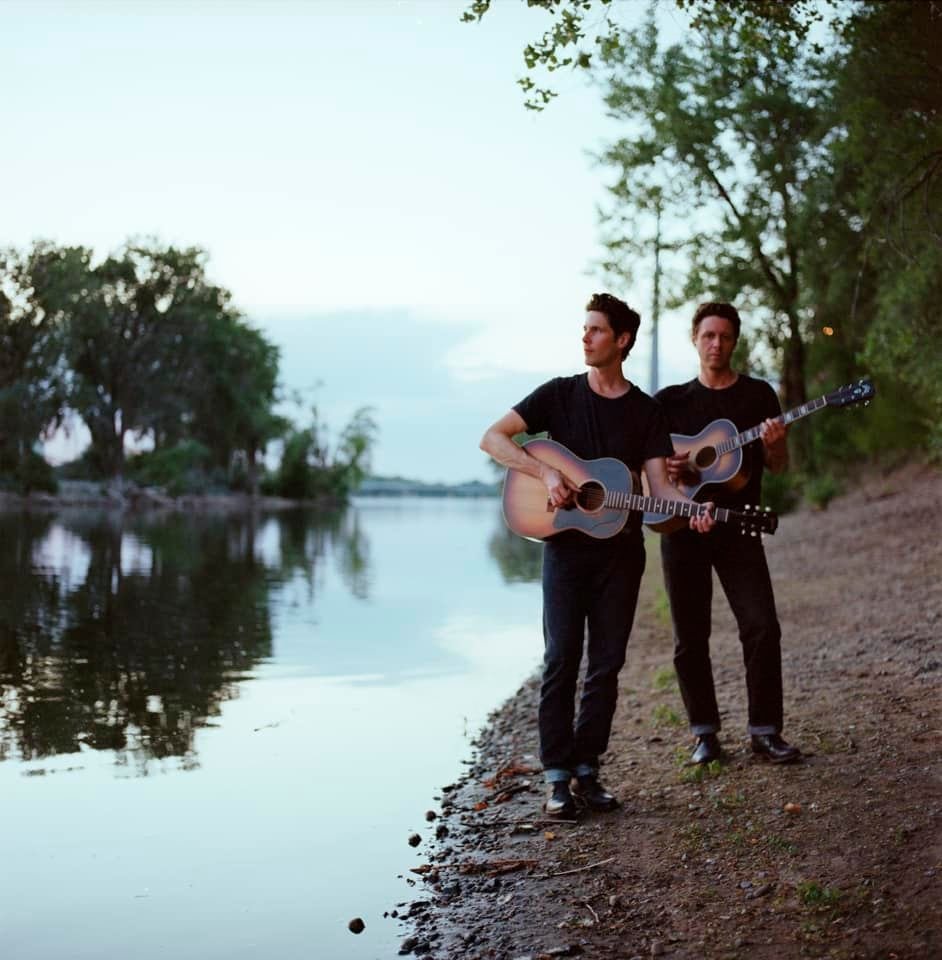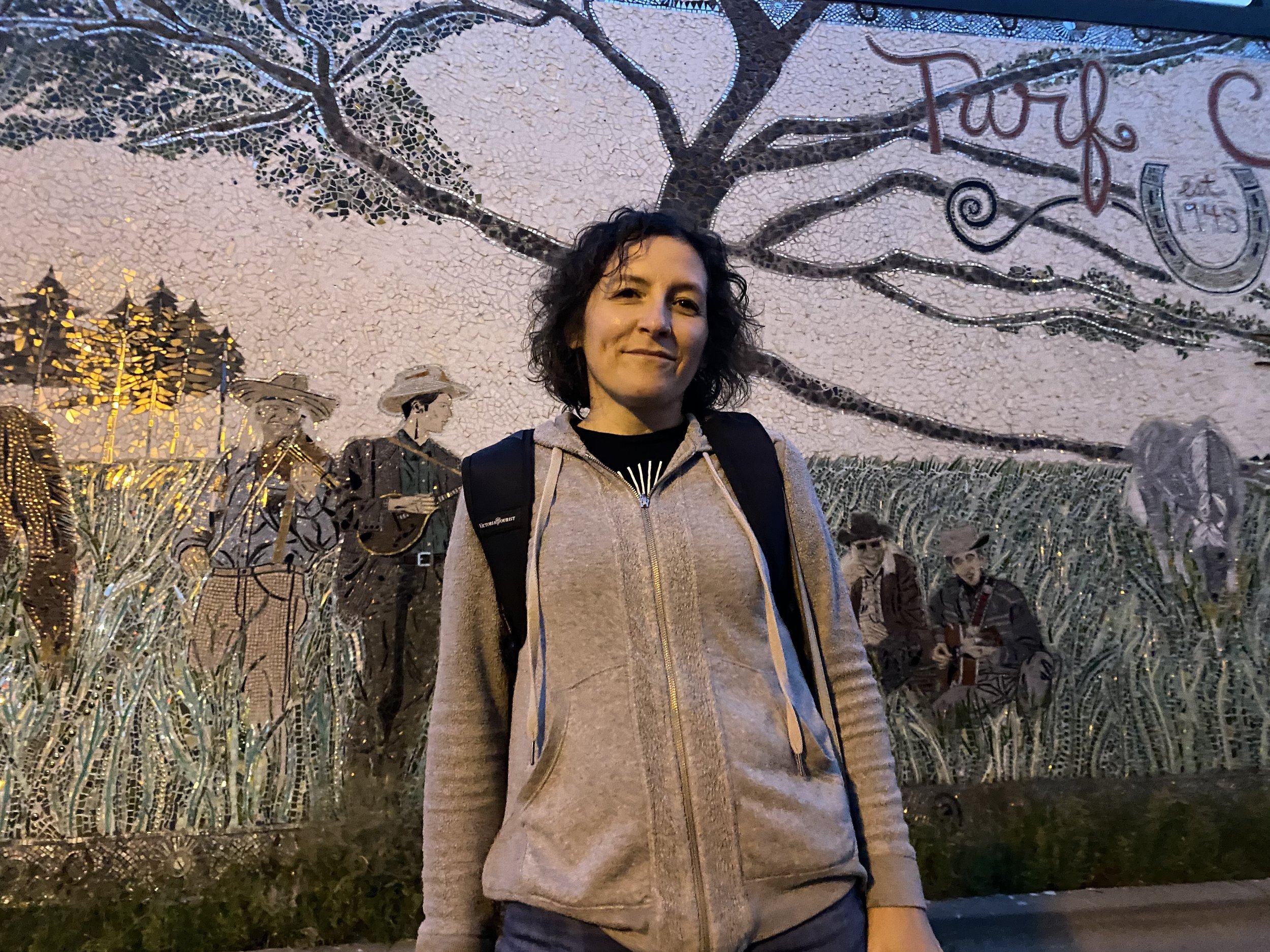Music Review: The Cactus Blossoms, ‘One Day’
Nostalgia, pain and optimism coexist on the Minnesota group’s new album, which showcases a new facet in their ever-evolving sound.
One thing you can always expect from The Cactus Blossoms—the Minneapolis-based act fronted by brothers Jack Torrey and Page Burkum—is that their sound will evolve noticeably, sometimes dramatically, with each new album.
From their early 2000s independent releases as an arrestingly authentic old-time country band, their first label record in 2016, You’re Dreaming was already markedly different—still hearkening to the past but losing the pedal steel and fiddle, and bringing in drum, electric guitar and some rockabilly elements and modern touches. Their 2019 release Easy Way was a more dramatic departure and an exploration of various sounds, from driving (if still tuneful) rock to a kind of easygoing 1970s country pop. A single released in 2020, “Happy Man,” leaned farther into the latter with a breezy, mellow 70s folk pop groove.
The new Cactus Blossoms album, One Day, takes that 70s folk/rock/pop feel a step further and enriches it, creating a layered, polished sound that's retro but original. The brothers take turns with lead vocals and push their sound in a few different directions, but the overall record feels confident and cohesive.
No matter how their sound changes, two elements of The Cactus Blossoms’ music can always be counted on: strong melodies delivered by Torrey and Burkum’s unearthly gorgeous blood harmony, and deceptively simple lyrics that convey emotion and paint pictures while evading definitive literal interpretation.
On One Day, I sense more of a theme than with any of their previous ones, although it could be that, collectively, everyone on the planet has gone (and is still going) through a traumatic time that’s changed how we think. Being one of those humans myself, I probably listen to and interpret lyrics differently because of what I’ve gone through.
But I sense a strong through-line in most of the songs on the album: a longing for and celebration of human connection and resilience. These themes will remain timeless, if the pandemic ever recedes in our rearview mirror. But especially in these times, this album feels particularly important and welcome.
Something that struck me profoundly in Charlie Parr’s most recent release The Last of the Better Days Ahead was how it managed to simultaneously look back, stay in the present and give a feeling of forward momentum. That was my first impression on listening to One Day all the way through for the first time. There’s bittersweet nostalgia and a sense of loss, there’s a feeling of a pause—to take stock, be in the moment, process feelings—and yet, there’s a freshness to it, a feeling of rebirth and rejuvenation and movement that’s intoxicating.
Looking Back
Two songs primarily explore the past, “Runaway” and “Not the Only One.” “Runaway” is a universal spin on the classic theme of lamenting about a fly-by-night lover—reminiscent of The Cactus Blossoms’ “Clown Collector” in its theme and upbeat sound, though without the older song’s grudging admiration for the player in question.
“Not the Only One” is a nostalgic ode to the Twin Cities’ old-time country/folk scene of decades past. The song name-checks Minnesota legends Sammy Lind, Spider John Koerner, Dave “Snaker” Ray and Tony “Little Sun” Glover. When Burkum sings of “Walking down the street in cowboy boots,” I can’t help but picture Cedar Avenue in the West Bank neighborhood of Minneapolis, where the mainstay Palmer’s Bar used to be in good company with the 400, the Viking and the Nomad (sadly, all gone now, as are Glover and Ray). There’s a celebration of the old times in the lyrics but also a piercing sadness, tinged with resignation: “I get along / I get by / I get gone / I get high.” The sense of community and connection that runs throughout One Day, though, comes through in the refrain: “I know I’m not the only one.”
Being Present
Four tracks on the album linger primarily in the moment, in ways both personal and universal. “Everybody” feels like a pandemic-era song, although its lyrics will still resonate when this long terrible time is hopefully a distant memory. Communication became so difficult during the nightmare of early lockdown; I’d neglect to contact friends for months, or I’d reach out and get almost nothing in return. That all comes back in the first few lines:
Here we go again
Askin’ where I’ve been
I’m gonna leave it up to you
Nothin’ I can say or do
It’s a resigned, even cold opening, backed by minimal instruments. Then, a rare guest vocal (Jenny Lewis), almost in a whisper, adds a warm counterbalance to the lack of communication:
If I don’t talk much
Or tell you such and such
Doesn’t mean I don’t care
At that, the song bursts open into a celebration of our collective will to survive and persist:
Everybody tryin’ to do what’s right
Everybody stayin’ up all night
Everybody waitin’ for the light
In my best moments in 2020—which weren’t that frequent, I’ll admit—I too was able to imagine our separate togetherness to keep me going, and it’s still a powerful concept.
There’s an urge to “do what’s right” in the atmospheric “Ballad of an Unknown.” In a city of people rushing to get somewhere, someone stops to help a stranger lying on the pavement. A feeling of grim inevitability permeates (“Fate is an arrow / Can’t pull it out”) but not of acceptance that this is the way the world should stay, as the dying man’s whispered question “How long can this go on?” becomes the song’s refrain.
In “Lonely Heart,” another solitary person wanders through the night, freshly hurt by the loss of a friendship or relationship (“I always thought I had a friend I could trust / but now I see that all I got is me.”) Despite that, the song conveys a craving for connection, and the lyrics make me imagine the narrator ending up at a bar telling his tale to a sympathetic stranger.
“I Could Almost Cry” could’ve been written about any of us at one point or another during lockdown, encapsulating in a few words the feeling that the world was falling apart and the longing for connection and change: “Broken lock, broken key, broken everything but me / and the door is open wide.” Whether it’s describing a specific loss like a break-in or a bigger breakdown of society, I hear that last line several ways: it speaks of feeling vulnerable and unprotected, but also of the possibility for connection and change. Even though it’s a mournful song, there are hints of hope for a brighter future.
Looking Forward
And this album has plenty of future-focused themes. In fact, it opens with the song that has the most literal momentum. “Hey Baby” thrums with restless energy as the narrator imagines a road trip: “We could drive the whole night through / see what this old truck can do / I’ve only driven it in town.” Whether or not it’s a lockdown-era wish for freedom (maybe I just read that into every new song about traveling), there’s an undercurrent of uncertainty, with references to finding “a silver lining” and hopes that “clouds aren’t in the way.” The refrain brings this worry to the surface—“I hope it all works out”—but shrugs it off every time with casual optimism: “It always works out.”
The title track also has a confidence about the future, but its sparse, simple lyrics over an easygoing rhythm cause mixed emotions. At its core, “One Day” seems to be about someone telling the person he’s left that they’re better off without him. But there’s enough space in between each line to read into the situation a little differently each time. Is it grief, optimism or yearning in their voices when they linger in soaring harmony on the words “one day”? It depends on which line comes before—”You’re gonna miss me when I’m gone” or “You’ll have a chance to move on” or “I will forgive and never forget.”
If “One Day” is about the future promise of moving on from a relationship, “Love Tomorrow” is about the potential of starting a new one: “Do you feel the way I feel?” the first line asks hopefully. But the focus of the song is on the chorus, so it feels more like an anthem or rallying cry for what the world needs now: “Love tomorrow / Love today / Love to show us the way.”
“Is It Over” strikes me as combining all three elements of past, present and future. I’ve read that this track imagines a past-his-prime country star contemplating a return to the stage, yet also references The Cactus Blossoms’ own old-time past (“You did a waltz in your country phase” could be about their perennial crowd-pleaser “Adios Maria”). The perspective of the lines shift from second person to first (“Give me the hook, but not too fast / I always save the best for last”) and back again, which keeps the context elusive.
“Is it over?” repeats several times, hanging unanswered over the final notes of the song, feeling like a worried rhetorical question that we’ve all asked in many ways in these increasingly dire times—Is the pandemic over? Is normal life as we knew it over? Is the planet over? But it also seems to ask, who gets to say “it’s over” if someone wants to get back on stage, try again, keep going when others say they’re washed up? I glean both meanings out of those words when I listen to this song. The melody is elusive too, sounding bright and peppy at times, plaintive and resigned at others. It’s a puzzle of a song, and one of the most pleasing on the album.
On first listen, “If I Saw You” seemed an idiosyncratic choice to be the final track—I felt like it should’ve opened the album since it starts with a greeting: “Hello, it’s been a long time.” It’s like Torrey and Burkum deliberately chose the polar opposite of the song that closed out two of their albums (and countless live shows), “Traveler’s Paradise,” which begins “Goodbye, sure is good to know you.”
But as I kept listening to “If I Saw You,” which is framed as one side of an awkward conversation (possibly during lockdown) between friends or lovers who haven’t spoken in a while, it seemed more and more perfect as a closer. The Cactus Blossoms took a long break (of course) from performing live. For the normally hard-touring band, it was probably a disorienting change, reflected in the lyrics: “Last night I had a crazy dream / I was with you, I thought it was real.” The conversation and song and album end with the line “Has it been that long?” It really, really has, but hopefully the world won’t have to isolate ourselves from one another for that length of time ever again. The brothers just recently embarked on their first nationwide run of shows since late 2019 and will probably be echoing that sentiment to friends and fans who’ve waited a long time to see them again.
Carol Roth is a full-time marketing copywriter and the main music journalist and social media publicist for Adventures in Americana. In addition to studying the guitar and songwriting, Carol’s additional creative side hustle is writing self-proclaimed “trashy” novels under the pseudonym T.A. Berkeley!








